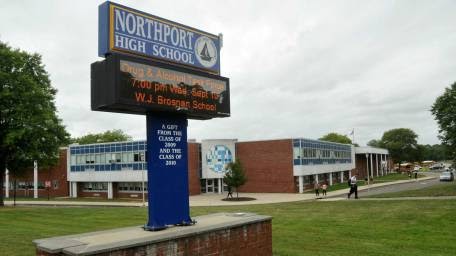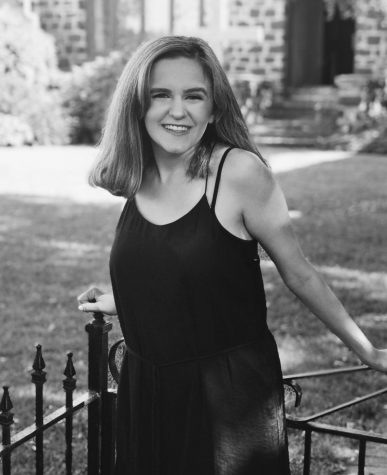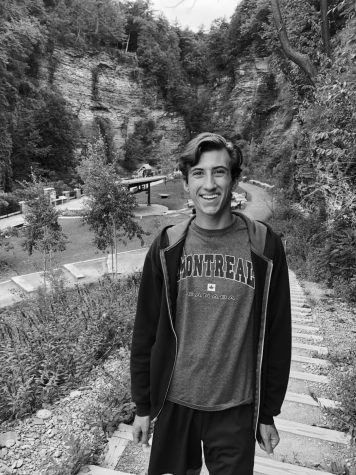Atypical Applications: COVID and the Class of 2021

The Northport High School Class of 2021 underwent a unique college application experience. (Credit: Newsday)
December 1, 2020
The 2021–2022 college application cycle has reached its peak and is slowly winding down. The Class of 2021 undoubtedly underwent a unique experience. While the application process is different for each senior, the COVID-19 pandemic affected universal elements of the application process — including campus tours, standardized tests, and counselor meetings. It’s never easy to complete the process that determines the next four years of life — its incredibly challenging in to he midst of a global pandemic.
We interviewed 33 Northport High School seniors to hear their perspective on this year’s atypical application process.
Of the 33 Northport High School seniors interviewed, an overwhelming majority said that the virtual college search and application processes brought with them some negatives. Shaylin Martinez (majoring in biology on the pre-med track), summarizes the senior struggle perfectly. “It’s a difficult process overall,” Shaylin says. “Now that there’s a pandemic it’s a lot more pressure to stay on task and do it all yourself.” For many seniors, this additional pressure comes from having to research schools independently. Sarah Monroy (majoring in nursing) elaborates on this challenge. “I think definitely not having as much in person time with counselors or college representatives was a major negative,” she claims. “I am the type of person to ask loads of questions, and with doing most of the college process online, it was much harder for me to get all the answers to my questions.” On top of that, many seniors relied on virtual campus tours — rather than in-person campus tours — to provide them with an understanding and feel of a school’s campus life. Sophia Lamendola (majoring in political science) characterizes this situation as a “big problem”. “I couldn’t go on real tours and see the schools with my own eyes,” Sophia says. “Yeah, they have the ‘virtual tours’ but it is not the same effect.”
Nonetheless, the Class of 2021 benefited from certain aspects of the virtual college search and application processes. For Jamie Saturno (majoring in marketing and minoring political science), “one positive effect [of the virtual application process] would be being able to work on it virtually anywhere”. Most seniors we interviewed agreed with Jamie that the virtual college search process enhanced the accessibility of information on schools. Some seniors, like Nicole Foster (majoring in nursing), also noted that the virtual college application process facilitated the organization of materials. Nicole claims that a positive of navigating the college process online was the lack of written documents. “All of my recommendation letters were put together online and I was able to keep everything organized on a separate Gmail on Drive,” she says.
Standardized tests are often considered to be an integral component of a student’s college application; however, as result of pandemic-induced testing center closures — which prevented many seniors from having multiple opportunities to take a test and work toward a desired score — standardized test scores will not be valued as highly in the 2020–2021 admissions cycle as they have been in other years; some colleges are not considering them at all. Still, each of the 33 seniors we interviewed maintained strong opinions about these standardized tests. Kailyn Kilroe (majoring marine biology / marine sciences) is frustrated with the system of standardized testing. “Personally, I think the SAT and ACT are a horrible way to admit someone into a school,” Kailyn says. “Speaking for myself and others, not everyone is a good standardized test taker… I am doing much better in school than my SAT would show. For this reason, I feel that these standardized tests aren’t a reliable way to represent someone as a student.” Meghan Lavin (majoring in business and accounting) offers a slightly different perspective of standardized testing. “I feel like they would prefer if you did send test scores and that they actually help (if they’re good). I feel pretty good about my score, but I don’t think the SAT is the best benchmark of people’s intelligence, and I think people put way more weight on it then necessary.” Ryan Pupilla (majoring in marine biology / marine science) comments on an adverse effect of schools’ test-optional policies. She notes that “[B]ecause so many schools are optional no one has really been teaching [us] how to send [scores]!” Ryan adds that she “didn’t even know you had to pay to send [scores] to each individual school”. While this change in admissions policies is certainly advantageous for Class of 2021, many schools have eliminated their standardized test score requirements entirely — a potential benefit for future applicants. Griffin Crafa (majoring in economics and public policy and minoring in foreign language) argues that a test-optional policy is beneficial. “I hope all schools decide to be test-optional after the pandemic,” he says. “Standardized tests are only a snapshot of a student’s academic abilities, and many times, students are “machines” when it comes to taking standardized tests; that is, they “churn out” a desired score.”
College is an investment. During the college search and application processes, students and their families take into account the finances associated with the four years of life after high school. The majority of seniors we interviewed consider the cost of college to be too high. Some, like Jesse Blitz (majoring in biology), feel that the exorbitant cost of college attendance augments the stress of an already overwhelming process. “The finances for college is the most stressful part about the entire experience,” Jesse asserts. Erin Munson (majoring in occupational therapy and exercise science) elaborates on these concerns. “It’s unfortunate that people have to go into debt to get a college degree and education,” she says. “We have to dig ourselves in debt to then attempt to make enough money after college to ever pay off that debt.” Camden Burk (majoring in environmental science / geosciences) agrees with Jesse’s and Erin’s views. “Honestly, finances are absurd,” he says. “Why should your parents be bankrupted to send their kid to school. Especially in a job market where college degrees are quickly becoming a norm, it seems incredibly unfair.” Like many, Camden also believes that college financial aid officers overlook the demonstrated need (the portion of the yearly cost of attendance that a family cannot afford to pay) of families in the Northport-East Northport community. “Just because we live in this wealthy area, it seems like colleges assume our parents can afford to spend half their gross income on college, which is pretty unreasonable especially given taxes and living costs here, plus the impact of COVID.” Emily Kovacs (majoring in biology) agrees with Jesse, Erin, and Camden, but is also bothered that each step of the college search and application processes is associated with a financial commitment. “Even the application fees are absurdly expensive,” Emily notes. “I do not like paying $80 for a school to send me a rejection letter.”
Some of the seniors we interviewed have committed to playing a sport in college. Tara Walsh (majoring in exercise science major and minoring in psychology) will play lacrosse at SUNY Cortland. Tara says that it was difficult for her to select a school without having an overnight experience. “Especially for Cortland, one major step is having an overnight with one of the players on the team,” she says. “The week before my overnight was planned everything just closed down… There were a few other colleges I was looking at, but I needed to show them a film of me playing… My juniors lacrosse season was cancelled, no film to show. My last chance to prove myself was over the summer but all of the tournaments and showcases were cancelled.” Conner Gallagher (majoring in biology or kinesiology and exercise science) will also be playing lacrosse at SUNY Cortland. He sees this year’s recruitment process in a positive light. “I think that since a lot of the top colleges are finished with their recruitment, you are gonna see a lot of great talent at the D2 and D3 levels,” Conner says. Abby Fortuna (majoring in finance and minoring in homeland security) will play lacrosse at Saint Leo University in Florida. Abby began to consider Florida schools after she received numerous emails from coaches following her participation in a lacrosse showcase in Florida. Abby recalls that she “started to look up and research those colleges” and then refined her list to the schools that really interested her. Abby also describes the difficulty she faced when deciding between two schools. “[M]y dad remembered this one school in Florida that was a good team and a beautiful campus,” she says. “Within the next two days we booked a flight, got a tour from the coach, and watched a game. I fell in love with the school and knew I could see myself going there.” Abby was convinced Saint Leo University was the school for her after remembering a piece of advice someone had given her: “Let’s say you get hurt and can’t play lacrosse anymore, can you still see yourself attending the college?” Rocco Stola (likely majoring in environmental science), will play football at Middlebury College. Rocco concurs with Tara about the implications of the inability to have an overnight stay. While Rocco was able to visit several of his top schools before the shutdown in March, he claims that “not being able to visit in-person to tour the college or talk to the coach during the summer made the decision making much more challenging”. Rocco notes that another challenge for athletic recruits was “everything being accelerated due to players losing their fall football seasons, resulting in recruits committing to whatever offer they had and spots filling up in the summer before the fall even started”. Like Abby, Rocco offers some advice for students entering the athletic recruitment process. “What helped me really start making decisions and picking Middlebury was talking on the phone with former/current players from each college I was looking at, and also talking with my brother and his teammates at the college he plays football for,” he says.
Some schools and programs of study require applicants to submit additional materials (for example, an audition or an artistic portfolio) with their application. Taryn Gerlach (majoring in engineering, architecture and studio art) submitted supplemental materials with her applications. “For the vast majority of my schools, I am submitting anywhere between 5 and 10 images of my artwork, and also a few violin recordings as an extra supplement,” Taryn says. She believes that these materials will help her “stand out from the crowd” and “remain a part of the artistic community in college”. Angelina Saccone (majoring in health sciences and minoring in music performance) completed an audition for some of the schools to which she is applying. Angelina claims that “auditions are easier [this year] because you need to send in a recording which you could do multiple times to get your best take.” She adds that recorded submissions calm nerves, since the performance will not be judged live. Students like Juliette Liberatosioli (majoring in English and minoring in art), who plan on pursuing art as a course of study, must include an artistic portfolio with their college applications. The art portfolio is a critical component of an intended art major’s or minor’s application, and Juliette has been “building up an art portfolio since 11th grade”. Compiling an artistic portfolio this year, however, was more difficult. Julianna Curcio (major is undeclared), feels that she “got cut short” for her portfolio. “I was planning on doing an FIT class in the summer and it got canceled,” she adds. With hybrid learning, it’s really hard for me to create the portfolio I need which is why I decided to go undeclared.”
After the long application process is complete, seniors can finally look forward to the experiences that will define the next four years of their lives. Alyssa Infranco (majoring in early childhood education and minoring in musical theater) is “really looking forward to being in a new environment and meeting new people”. Both Caroline Shaffery (majoring in early childhood education / special education) and Maggie Forbes (majoring in music education) agree with Alyssa that meeting new people is a highlight of the college experience. Vivian DeVoe (likely majoring in political science), is also excited to embark on the next chapter of her life. “I am most looking forward to narrowing down my career path within the general fields I am interested in, as well as the social aspect of college,” she says. Jess Conacher (majoring in textile design), an international student from York, England, says she’s nervous — but excited — to move to New York City. “I’m nervous about getting in… and as well as moving to New York City, and living there. I’m nervous but excited-nervous.” Alexa Cubiccotti (majoring in art history with a minor in anthropology) thinks “it’s great that we are all growing up and able to further our education in subjects we love”. Like Jess, Alexa is also nervous for the “new environment of college”, but she believes that “college is an amazing opportunity to do great things.”
After finishing the college search and application processes, the Northport High School Class of 2021 has some words of wisdom for those just beginning. Almost all of the 33 seniors we interviewed advised applicants to make use of the resources available to them, such as their guidance counselors and teachers. Julie Barbier (majoring in fashion marketing and management), Hope Jorgenson (majoring in English), Noah Rosensweig (majoring in education) and Emma Sperling (majoring in criminal psychology / profiling) encourage future applicants to start these processes early. “Don’t wait until the week before”, “get a lot done junior year”, and “over the summer”, are some of the key phrases in their suggestions to reduce stress. Brianne Chave (majoring in nursing) recommends that applicants “create deadlines” so they avoid “trying to cram everything in at once.” Brianne adds that “Virtual information sessions are also very helpful”; she claims that they helped her to “narrow down the colleges” she was considering. Annabella D’Ambrosio (majoring in exercise science and physical therapy) explains that powering through the sometimes overwhelming and stressful college search and application processes is worth it. “It’s definitely not an easy process,” she says, “but once you apply, you’re able to look back and say, ‘Hey! Look what I did!’”
Throughout the college application processes, many seniors feel as if they are struggling alone. But as these 33 seniors show, no one is ever alone. Every senior understands the irritation that accompanies standardized tests. Every senior understands concerns about affording college. Every senior understands the stress associated with completing applications. But every senior also knows the reward for working through the college search and application processes: four amazing years at college.
Perhaps we cannot end this article any better than with this quote from Griffin Crafa, “[A]lthough it may sound cliché and redundant — be yourself on the applications. Don’t try to make a college like you. When thinking of the answer to a prompt, don’t overthink; instead, write about the first thing that comes to mind. In general, approach the college application process with the mindset: which college is going to be lucky enough to have me.”
From the Class of 2021 to underclassmen and future college applicants: good luck! Enjoy the ride!
Ali Crosley and Jake Kalinowski would like to thank the following seniors who contributed their invaluable insight to this article: Julie Barbier, Jesse Blitz, Camden Burk, Brianne Chave, Jess Conacher, Griffin Crafa, Alexa Cubbicotti, Julianna Curcio, Annabella D’Ambrosio, Vivian DeVoe, Maggie Forbes, Abby Fortuna, Nicole Foster, Conner Gallagher, Taryn Gerlach, Alyssa Infranco, Hope Jorgenson, Kailyn Kilroe, Emily Kovacs, Sophia Lamendola, Meghan Lavin, Juliette Liberatoscioli, Shaylin Martinez, Sarah Monroy, Erin Munson, Ryan Pupilla, Noah Rosenzweig, Angelina Saccone, Jamie Saturno, Caroline Shaffery, Emma Sperling, Rocco Stola, and Tara Walsh.


